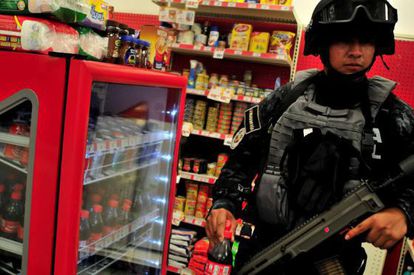Cash machines viewed as the most dangerous places in Mexico
Government poll also shows 92.8% of crimes go unreported over lack of trust in authorities


Inside some banks in Mexico, the use of cellphones is prohibited. The policy is part of security measures to thwart hold-ups by preventing messages being sent to people outside the bank describing customers who have just withdrawn large sums of money.
The rule might seem a bit exaggerated, but in Mexico, 81 percent of citizens believe that automated teller machines (ATMs) are the most dangerous places in the country, according to figures released this week by the country’s National Statistics and Geographic Institute (INEGI).
One in five Mexicans say they have been a victim of crime
The survey on the public’s perception of security also found that banks rank second in the list of places Mexicans consider unsafe, followed by the streets and public transport systems.
The poll is based on the opinions of adults who were asked a specific amount of questions over a 12-month period last year.
One of the most striking conclusions was that one in five Mexicans say that they have been the victim of a crime. The statistics are similar to those from last year, but two points higher than those recorded in 2012.
The states with the highest crime figures are Mexico, Baja California and Mexico City Federal District, and the most common offenses are robbery, extortion and fraud.
However, 92.8 percent of all crimes were neither reported nor investigated, according to the INEGI survey. Many of the respondents said they do not bother filing complaints about crimes that befall them because they either believe it is a waste of time or they simply don’t trust the authorities.
When asked about the country’s institutions, Mexicans held the army and the navy in high esteem. Both military bodies were the first to be called out into the streets by past President Felipe Calderón in 2006 in the government’s war against the drug cartels – a battle that claimed around 80,000 lives during his 2006-2012 term in office.
However, when asked about corruption in the military, more Mexicans believe that graft is rampant in the army (25%) and navy (17%) compared to previous figures.
This is the first time that the army and marines receive lower grades by citizens” INEGI statistics director Adrián Franco
“This is the first time in the history of the past five surveys that the army and navy have received lower grades by citizens in the areas of corruption and trustworthiness,” said Adrián Franco, the INEGI’s statistics director.
Last year, the armed forces’ reputation was tarnished following the Tlatlaya massacre, in which soldiers summarily executed a large group it claimed were drug traffickers, and the disappearance of 43 trainee teachers in Iguala, Guerrero state.
Despite the lower marks, Mexicans still rank traffic and municipal police as the most corrupt official bodies in their country.
English version by Martin Delfín.










































